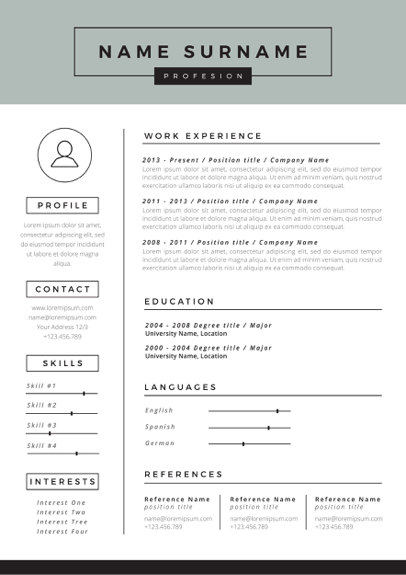When it comes to deciding if you should place education before experience or vice versa on your resume, the truth of the matter is that it depends on a number of considerations.
Regardless of how you proceed, however, you’ll need to do more than get the order right if you want the HR professional reviewing your application to shortlist you for an interview. That means ensuring that your spelling, word choice, and grammar are as impeccable as is the content.
With that said, read on for tips not only on how to decide when to lead out with education or with experience on your resume, but also how to ensure that your writing skills help rather than hurt your chances of getting into the school of your choice or getting the job of your dreams.
Because how you write is at least as important as what you write, grammar issues, such as the right use of sentences and common mistakes that job seekers sometimes make, will be considered before briefly touching on where to place education and experience on your resume.
Grammar Issues
When you put fingers to keyboard to create your resume, you need to consider grammar issues. Regardless of whether you lead out with education over experience or experience over education, you need correct grammar and accurate spelling in order to make the right impression. So, consider the following as you write and edit your resume:
Pronouns: When it comes to resumes, you should edit out any first-person pronouns you may have included. After all, your name goes at the top of the resume, so the recruiter will already know whose resume he or she is combing over. As well, stay clear of third-person pronouns when you are referring to yourself since you may come off as being pretentious. In order to avoid first-person and third-person pronouns, begin with verbs instead.
Sentences: Use simple sentences on your resume, and ensure that they are unambiguous. If your sentences are difficult to understand, your resume likely won't be read by a recruiter. While you’re at it, avoid the mistake of overdoing things on the writing front. In other words, don’t use the word scrupulous if what you really want to say is thorough.
Articles: Articles such as the, an, and a are often unnecessary when it comes to resumes. So, do your best to edit them out. Case in point: Instead of writing supervised the junior workers, write supervised junior workers.
Tenses: If you're describing a job or internship you're currently still doing, then stick with present tense. But if you're describing a job or internship that you've already completed, then stick with past tense. Be sure not go from present tense to past tense or from past tense to present tense illogically since recruiters will definitely pick up on this.
Verbs: Using verbs properly can help you to showcase your achievements and skills on your resume, but some verbs will actually have the opposite impact. Specifically, helping verbs such as may, might, or have will lessen the effectiveness of your claims of competence. So, instead of writing something like have supervised, write supervised.
Words: Words, of course, matter. Even so, using the wrong ones can make a bad impression. Be sure to check for proper use of certain words that are sometimes confused like their, there, and they’re. Other commonly confused words include affect -- as in to change -- and effect -- as in to facilitate a result; all together -- as in all in a single place -- and altogether -- as in on the whole; and complement -- as in to enhance -- and compliment -- as in a remark denoting admiration.
After having considering grammar issues to be mindful of, it’s important to consider where to place what and where on your resume.
Career Focus
Depending on your career focus, it might make more sense to focus on experience over education or education over experience. For instance, if you're preparing for a career in sales, an employer is more likely to be impressed by a proven track record of success on the sales front than by a degree. Meanwhile, if you're going to enter the information technology or information security field after college or university, putting your degree ahead of your experience, such as if you have an IT or computer science degree, might make sense. So consider your career focus and then mull over whether education or experience is most likely to earn you further consideration for jobs.

Again, don’t underestimate the importance of producing a quality resume. Many HR professionals will, as part of the elimination process, scrap resumes with grammatical errors. So, you need to fine-tune and edit your resume to ensure that your grammar is up to snuff.








Have a discussion about this article with the community:
Report Comment
We're doing our best to make sure our content is useful, accurate and safe.
If by any chance you spot an inappropriate comment while navigating through our website please use this form to let us know, and we'll take care of it shortly.
Attachment
You need to be logged in to favorite.
Log In